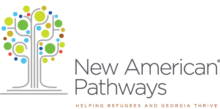Amanda Stables is our Civic Engagement intern. She is working toward her Masters of Social Work at the University of Georgia. She is pictured above far right.
I stepped into the open area of a MARTA station entrance armed with a clipboard, pens, my New American Pathways badge and a mission.
As I waited for the first flood of passengers to pour through the gates and into the sunlight, I thought about what strategies to use. Stationed there to help people register to vote, I wanted to engage with as many people as possible so anyone who needed to register or update their address could do that right then and there.
At first, I wondered if people would ignore me or respond negatively. Would they think I was trying to sell them something? Would they be annoyed? Would they assume I was pushing a political agenda?
The train unloaded its riders and the gates released the first wave of people continuing their journey to work or home. To my delight, no one was rude or annoyed. Many passers-by thanked me for doing the work of voter registration and several stopped to register to vote. Mission accomplished.
“I’m already registered, thank you.”
“I’ve voted in every election since 1976!”
I heard many statements like this as the crowds swelled. It turns out that a lot of citizens think voting is important, and getting registered is the first step to being able to participate in this historical aspect of American citizenship. While some people abstain from voting, many citizens – both natural-born and naturalized – consider voting to be an essential and meaningful right. To exercise this right is to participate in the rich and ever-evolving legacy of American democracy and equality.
Now that the deadline to register to vote has passed, eligible voters across Georgia are preparing themselves for the big election. However, obstacles or confusion may still exist for people who want to make their voice heard at the polls.
Here are some responses to misconceptions about voting so that you can encourage people to get out and vote:
- My vote doesn’t matter:
A lot of eligible voters both young and old say that they don’t see the point in voting because it won’t make a difference. This simply is not true. While the presidential election is very high-profile, it’s not the only thing on the ballot that Georgia voters will influence. This election’s ballot measures will potentially affect our schools and the way the taxes we already pay will be used by the state. Every single vote counts, and many local elections are decided by margins so small you may kick yourself for not showing up and contributing.
- Ballots are confusing and I’ve never heard of these people: You can find a sample ballot in order to familiarize yourself with it before you go to vote from the Secretary of State. You can also research and learn more about candidates and at Vote Smart or through the League of Women Voters. Another thing to remember is that if English isn’t your first language or you need other assistance to vote, you are allowed to bring someone to the polls with you. They can help you translate, explain instructions and assist you in the voting process.
- I don’t want to stand in line on Election Day: You don’t have to! You have options: vote early or vote by absentee ballot. Find early voting locations in your precinct by checking your information at the My Voter Page.
- I don’t know where I go to vote: Check My Voter Page! When you enter your name, county, and date of birth, you can access your voter registration status, polling place, directions to your polling place, as well as the sample ballot and request form for an absentee ballot. The My Voter Page is a comprehensive resource for Georgia voters – make sure to check it out!
